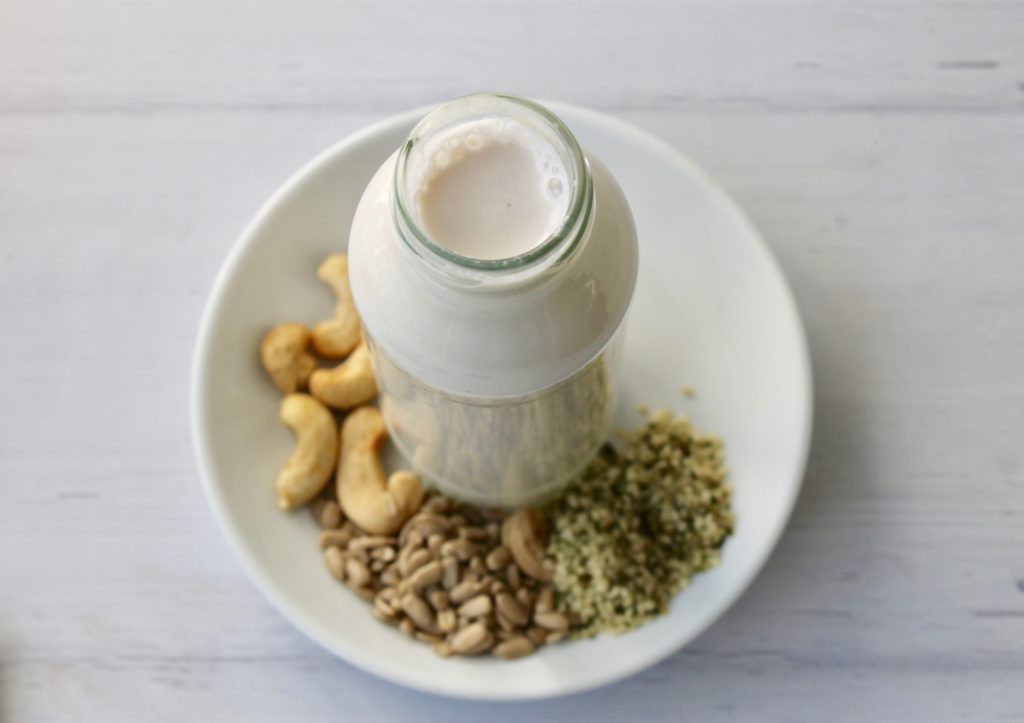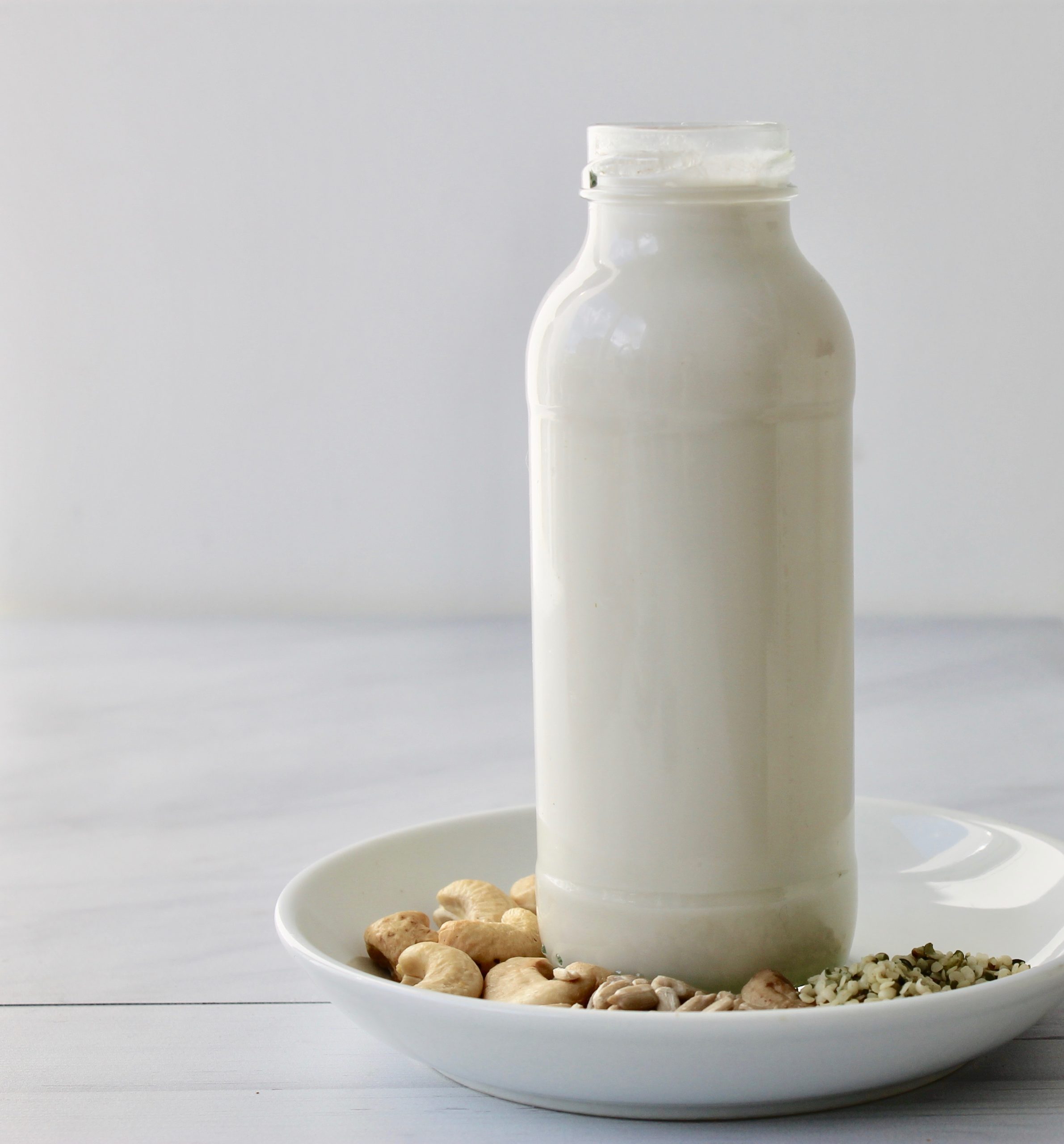Is dairy bad for IBS? I get asked this questions frequently. The answer is: it depends.
Gluten and dairy are the first culprits to eliminate when trying to pinpoint food triggers or troubleshoot/ease digestive symptoms.
Dairy is a common food sensitivity. But not everyone is sensitive.
Gluten has a damaging effect on the gut lining, but dairy will only damage the gut lining if you are highly sensitive.
Dairy sensitivity versus digestion issues
You can determine if you are sensitive to dairy by eliminating it for at least a week and then reintroducing it. Or taking a food sensitivity test. My favorite food sensitivity test is the complete food panel by Vibrant Wellness. This is the one I use with clients.
If you have a sensitivity to dairy, it will inflame your immune system, which can in turn cause damage to the gut lining.
You can be sensitive to the lactose (sugar) or casein (protein) in dairy.
Lactose intolerance is not the same as a sensitivity. It causes bloating or gas when you have trouble digesting the lactose milk sugar.
Those who have trouble with dairy because they can’t digest lactose can use an enzyme to fix that problem. Lactose-free milk is actually just regular milk with a lactose digesting enzyme added to it.
Lactose is a highly fermentable sugar that can feed bacteria in the gut. That feeding bacteria off gas endotoxins, which causes bloating.
Cheeses such as cheddar, parmesan and Swiss are virtually free of lactose due to the cheese making process. The sugars in the milk are almost completely digested. And the longer you ferment yogurt the less sugar it has and the more sour it becomes.
Goat and sheep dairy have lactose molecules that are easier to digest than cow dairy. Those who react to cow dairy may do better with organic goat or sheep dairy.
Cow dairy tips and myths
Here are some common complaints against cow dairy. And a myth that needs busting.
Cow dairy can be mucus forming. So it can interfere with detox by clogging the liver’s bile producing capacity. Bile helps digest fats and other nutrients, as well as cleansing the small intestine.
Conventional diary cows are given hormones and antibiotics and ed pesticide-laden grains. You also consume these things when drinking their milk. If you do drink milk, then organic milk is a must to decrease toxins and support the biome.
Lastly I want to address the calcium myth.
Milk is not the best source of calcium. The best source of calcium are leafy greens, sardines, canned salmon, almonds and chia seeds. The calcium in milk is not well absorbed and can actually have detrimental effects. Drinking milk will not help prevent osteoporosis.
Milk substitutes
If dairy clearly does not work for you, the good news is that there are many alternatives to enjoy.
I have a recipe for a the nut-based cheese spread in my Treats That Heal spring and summer cookbook.
And if you’ve never heard of zucchini cheese, Google it. It’s made from zucchini, gelatin, coconut oil, lemon juice and water. It’s really gut friendly, and yummy when melted.
Below are some creamy, tasty replacements for milk or cream.
There are many packaged non diary milk options available (due to rising dairy allergies) but the cleanest and healthiest option is to make your own.
I have a super fast and easy recipe for 2 minute nut milk that you can make by the glass. No need to prep, soak or strain anything.
And below I’m also sharing my basic recipe from my cookbook for no strain nut milk.
It uses coconut water as a sweetener.
DIY nut milk recipe
Making your own milk is easy. Especially with this recipe. Your milk will be super clean, with no gums, thickeners, sugars, additives or chemicals to react to.
Carrageenan is the additive that’s most important to avoid because it’s harmful to the gut. It’s typically found in coconut milk, and other packaged non dairy milks, as a thickener.
Straining your nut pulp from the milk is the hardest part. This recipe shows you how to skip it by using specific nuts.
My two minute nut milk recipe uses any nuts and seeds you want, with a brilliant hack.

Ingredients
32-33 ounces of coconut water (you can also use water and sweeten with dates, but the coconut water lends an amazing light, natural sweetness)
1 cup of RAW cashews or macadamia nuts (raw is key, roasted nuts produce a grainy milk). Macadamia nuts are lower in carbs and FODMAPs.
Enough water to cover the nuts by 1 or 2 inches
A coconut water with no additives.
How to
Soak the nuts in water for 4 to 5 hours
Drain the soaking water and rinse the nuts. (Pro tip: Soaking nuts makes them much easier to digest by breaking down the lectins and phytic acid).
Throw nuts into high-powered blender with coconut water. If using plain water add a couple of soaked dates.
Start blending at low and slowly raise to high. Blend for a few minutes, pausing to rest the blender if it begins to get too hot.
The milk may be slightly warm or hot after blending. If so, let cool and transfer to container and store in the fridge for up to 4 days.
To make the milk last longer, freeze it into ice cubes and defrost for later use.
Note: if you are using nuts or seeds other the two listed above, that do require straining you will have to them soak longer (between 6 to 8 hours).
After blending, pour through a fine mesh nut milk bag and squeeze out the liquid into a large bowl until only the flesh remains. You can dehydrate the leftover nut pulp in the oven at the lowest temp setting and use it as a “flour”,
I’ve made milk out of pumpkin seeds, sunflower seeds, hemp seeds, sesame seeds, brazil nuts, walnuts, pecans, almonds, pistachios. tigernuts, shredded coconut and hazelnuts. Cashew is my favorite. But macadamia milk is a close second.
If DIY milk is not your thing, here are some store bought non-dairy milk alternatives.
Non dairy milk alternatives
Soy milk– This is my least favorite type of milk because soy is estrogenic and can have a negative effect on hormones.
Pea protein milk– My favorite kind of vegetarian protein is made from spit peas. This is my favorite brand of pea protein milk. It is surprisingly creamy. It does contain vegetable oil, which are not ideal to consume as they can be inflammatory.
Hemp milk– This milk is made from hemp seeds which are low on the common allergy list and full of anti inflammatory omegas and well as protein.
Oat milk– This milk is naturally sweet from the natural sugars/carbs in the oatmeal. A word of caution with this milk: make sure you get a certified gluten-free brand because oats are often contaminated. Oats are also full of lectins, which can be harsh and abrasive for the gut lining.
Rice milk– This milk is highest in sugar and can destabilize blood sugar.
Coconut milk– It is super creamy with the antimicrobial benefits of coconut but does not make a great creamer as the fat and solids can separate or clump in hot liquid.
Flaxseed milk– Such as healthy milk that tastes surprisingly good. It is full of omegas. It is high in omegas and packs the other benefits of flaxseeds. This is my favorite brand of flax milk.
Enjoy any of these non dairy milk replacements with my 4 ingredient prebiotic cookies without inflaming your gut or triggering IBS symptoms.


